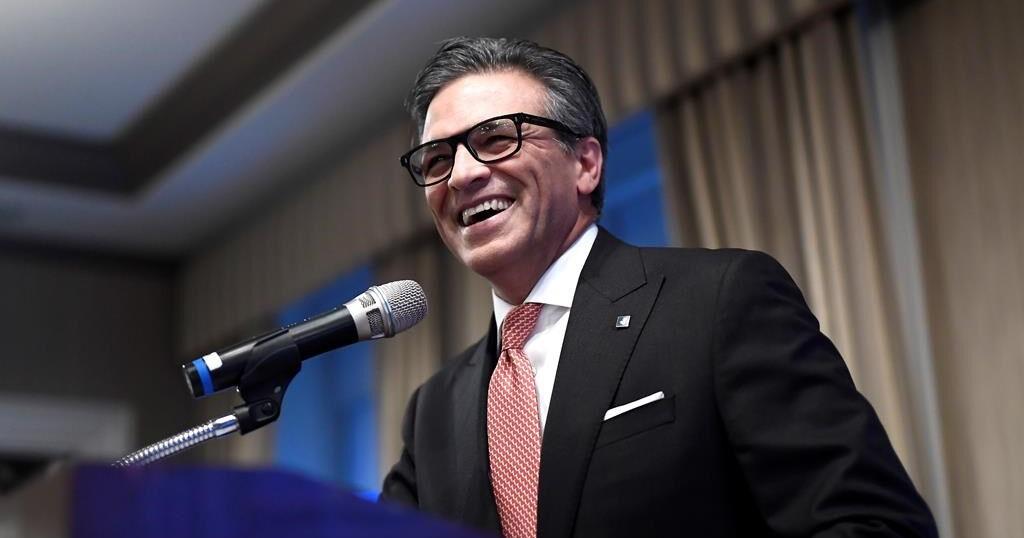WASHINGTON – One of Canada’s most influential business lobby groups is warning Ottawa about damage to the relationship with the United States after the Biden administration escalated efforts to halt the federal government’s tax on large foreign digital services companies.
The Business Council of Canada called for the digital services tax to be revoked after the Office of the United States Trade Representative requested dispute settlement consultations under the Canada-U.S.-Mexico trade agreement.
In a Sept. 9 letter to Finance Minister Chrystia Freeland and International Trade Minister Mary Ng, Goldy Hyder, the council’s president and CEO, said retaliatory measures by the U.S. would be harmful to Canadian families, businesses and the economy, while also negating any projected tax revenues.
Hyder cautioned the tax could also be destructive to Canada’s relationship with the U.S. ahead of the review of the trade agreement in 2026.
“In successive meetings with senior U.S. officials, we have been repeatedly told that if Canada’s unilateral DST remains in place it will imperil the upcoming mandatory review of the CUSMA,” Hyder wrote.
Americans have been critical of the three per cent levy on foreign tech giants that generate revenue from Canadian users. It means the companies will have to pay taxes on that revenue in Canada.
U.S. Trade Representative Katherine Tai, after requesting dispute consultations in August, called the tax discriminatory and said it is inconsistent with Canada’s commitments not to treat U.S. businesses less favourably than Canadian ones.
If the two countries are unable to resolve America’s concerns within 75 days, the U.S. may request a dispute settlement panel to examine the issue.
Ng and Freeland have remained steadfast behind the tax. They said last month that consultations under the trade agreement’s dispute mechanism will demonstrate Canada is meeting its obligations.
Hyder said Ottawa’s strategy will neither address nor assuage U.S. concerns. Instead it will risk undermining the trade agreement and “our most important trade and investment partnership,” he said.
The digital tax was part of the Liberal election platform during the 2019 campaign. Both the Conservatives and New Democrats proposed similar levies.
The Liberal government, however, delayed its implementation in order to give more time to global efforts to establish a broader, multinational taxation plan.
But after significant delays to that process at the Organization for Economic Co-operation and Development, Canada went ahead with its own tax.
The Canadian ministers have said the preference has always been a multilateral agreement.
Greta Peisch, the former general counsel for the Office of the U.S. Trade Representative, said concerns around Canada’s approach to the tax have been raised for a long time.
“I think the United States has been clear about how serious it is,” said Peisch, a partner at Wiely Rein in Washington, D.C.
“The argument is not that you can’t have a DST, it’s just that it should be neutral and not be inconsistent with our trade agreement.”
Peisch said the issue is around global revenue. Canada’s tax applies to foreign and Canadian digital services providers that earn total annual revenue from all sources of 750 million euros or more, and annual Canadian revenue more than $20 million a year.
Peisch explained American’s issue with the tax: if two companies provide the same service and have the same revenue from people in Canada, the foreign company will be treated differently.
“We have commitments in our trade agreements not to discriminate based on national origin among the trade agreement partners, that would be inconsistent with our trade obligations,” Peisch said.
The digital services tax has drawn opposition from trade associations and business groups on both sides of the international border.
Last month, Google announced it will implement a 2.5 per cent surcharge for ads displayed in Canada starting in October. Groups representing Canadian advertisers have warned other companies could follow the tech giant’s lead.
This report by The Canadian Press was first published Sept. 10, 2024.
